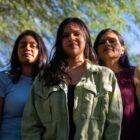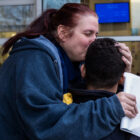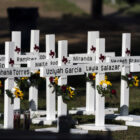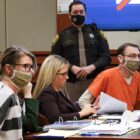
In late September, Torri was driving down the highway with her 11-year-old son Junior in the back seat when her phone started ringing.
It was the Hamilton County Sheriff’s deputy who worked at Junior’s middle school in Chattanooga, Tennessee. Deputy Arthur Richardson asked Torri where she was. She told him she was on the way to a family birthday dinner at LongHorn Steakhouse.
“He said, ‘Is Junior with you?’” Torri recalled.
Earlier that day, Junior had been accused by other students of making a threat against the school. When Torri had come to pick him up, she’d spoken with Richardson and with administrators, who’d told her he was allowed to return to class the next day. The principal had said she would carry out an investigation then. ProPublica and WPLN are using a nickname for Junior and not including Torri’s last name at the family’s request, to prevent him from being identifiable.
When Richardson called her in the car, Torri immediately felt uneasy. He didn’t say much before hanging up, and she thought about turning around to go home. But she kept driving. When they walked into the restaurant, Torri watched as Junior happily greeted his family.
Soon her phone rang again. It was the deputy. He said he was outside in the strip mall’s parking lot and needed to talk to Junior. Torri called Junior’s stepdad, Kevin Boyer, for extra support, putting him on speaker as she went outside to talk to Richardson. She left Junior with the family, wanting to protect her son for as long as she could ...

TUCSON, Arizona — Adriana Grijalva was getting ready to head to class at the University of Arizona in the fall of 2022 when she got a text message from her cousin telling her to stay put. The cousin, who works in maintenance at the university, had watched law enforcement descend on campus and reached out to make sure she was safe. A former student had just shot a professor 11 times, killing him.

Equal Justice USA (EJUSA) announced October 8 that it will partner with four new communities to build new restorative youth justice diversion programs. Restorative justice includes an accountability process that identifies root causes of youth criminal actions, while providing an opportunity for healing both for the person harmed and the person who has caused harm.

Louisiana is the only state to pass and then reverse Raise the Age legislation. Louisiana’s criminal justice system now treats all 17-year-olds as adults. Is reversing Raise the Age making a difference in the number of violent crimes by 18-year-olds?
More Headlines

The 9-year-old had been drawing images of guns at school and pretending to point the weapons at other students. He’d become more withdrawn, and had stared angrily at a teacher. The principal suspended him for a week. Educators were unsure whether it was safe for him to return to school — and, if so, how best to support him.

Research revealed that about 30% of the 116 state and local officers who responded in a May 2022 survey did not get active shooter training after graduating from police academies. Of those who had been trained, many received such instruction only once in their careers.

Just three days before her 15-year-old son carried out a mass shooting at his Michigan high school in 2021, Jennifer Crumbley was captured on security camera leaving a shooting range with the handgun in tow. She had just taken her son out to target practice in what she described on social media as a “mom and son day testing out his new Christmas present:” a 9-millimeter pistol the high schooler referred to online as “My new beauty.”

Recently, at one of the writing workshops that I teach at three juvenile lockups in and around my hometown of St. Louis, one of my students posed a provocative question: “Why should I write about changing the world when the world doesn’t care about me?”

The roundtable discussion focused on the importance and effectiveness of mentoring and encouraged participation in mentorship opportunities for Florida’s youth.

In 2019 on Halloween, my wife and our daughter had watched an NYPD officer drive the wrong way up a Brooklyn street and hit a Black teenager. When the boy rolled off the car and ran away, the officers turned their attention to other nearby Black boys. The police lined them against a wall, cuffed them and took them away.

When you say the names of the Chicago communities where I grew up, they may evoke negative images. Both are neighborhoods with some of the city’s highest rates of gun violence. I grew up in North Lawndale and have lost friends and family on its streets. In the spring of ninth grade, one of these murders changed my life.

The judge responsible for the administration of a troubled juvenile detention center in rural southern Illinois abruptly moved to close it as of Dec. 31, citing staffing shortages that made it difficult to meet new state standards governing the treatment of youth in custody.











